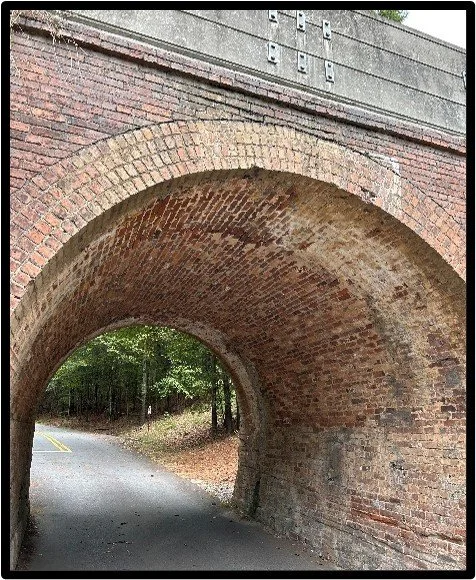Macon Day-cation, Fall 2023
With schedules too busy to take off for a full week during Wally’s fall break, we decided to go down to Macon, Georgia, about two hours from our home, and see the Ocmulgee Mounds I had seen advertised in a newspaper flyer. After crawling and slogging our way through the Atlanta traffic, that moving slug of red tailights, we arrived in Macon and headed to the Ocmulgee Mounds National Historical Park. The site was established by FDR in 1936 as a National Monument and then in 2019 redesignated a National Historical Park. The park’s visitor center, built in the art deco style of the 1930s, has informative displays about the peoples who occupied the mounds, beginning with the Paleo-Indians before 9600 BCE and on to the present day. It also has displays about the massive archeological digs, artifact cataloguing, and the work of the CCC. Their displays and signs throughout the park are informative, aimed at a middle-school audience, of which there were two busloads on a field trip when we visited.
After our orientation at the Visitors’ Center, we headed out to the first of several mounds in the park. This first one, the Earth Lodge had a reconstructed interior so that visitors could go into the mound and view the reconstructed meeting or ceremonial room. It is like going into the belly of the earth to practice the forms of human community within the holds of the natural world. I have descended by ladder into Kivas in the Southwest, also circular rooms set into the earth, allying human with mother earth. It seems to matter how you enter that interior space, from the open sky above or by tunneling in. The Ocmulgee mound room was accessed by visitors through a side, tunnel-like entrance tube that brought you to a viewing spot of the room, fire pit and circular seating staged by the park. The room seemed musty, smelling of earth, the deep thrum of ancient ritual, the meeting of the human community in that dark belly of the earth.
We walked out to some of the other mounds, climbing the steps to the top of one, looking out over the terrain, the tops of Macon’s buildings visible in the distance and the rail line that cut through the mounds in the 19th century, disrupting sacred grounds to connect Macon and its cotton to the ports in Savannah.
Besides getting a lesson in history of the long occupancy of the area and the migrations of peoples into and out of it, we strolled along paths between mounds and around the nearby wetlands. Signs warning of alligators and feral hogs in a park sitting within the city limits, though all was quiet on our little walk.
A poster for a reading by Joy Harjo, past US Poet Laureate and a member of the Muscogee Creek Nation caught my eye as we were leaving. I taught her memoir, Poet Warrior, the last time that I taught Southwestern American Lit to my South Texas students, but I am reminded by the poster that her family comes from the Southeast, the inheritors of the mounds, survivors of the Trail of Tears that took them to Oklahoma. This past resounds in her poetry and memoir, beating behind the present and moving it forward: “ Growing memoires and the ability to access memory is a skill that allows access to eternity” (13). Note to self—next time she does a reading in Macon, go.
Lunch next up. Downtown Macon at the Rookery—a fried green tomato BLT for me and one of their specialty hamburgers for Wally. The downtown a mix of old brick and stone, of boarded up store fronts, and refreshed attempts to revitalize. Like downtown Louisville, it seems to be trying to come back to life, to attract visitors and revive the Southern Soul music scene of the 1960s and 70s of the Allman Brothers, Little Richard, and Otis Redding. Next time, we’ll do a music tour.
For this venture, we ended by touring the Harriet Tubman African American Museum. A beautiful museum with art by trained and untrained artists—the sculptures shaped by bottle tops a twist of whimsy and pathos. Like other museums, it seeks to preserve memory and story, the local stories that often disappear with time and hegemonic pressure to tell a history bleached of conflict, justice, and resilience.
Back in the car for another go at the Atlanta traffic after a full day of day-cationing.



